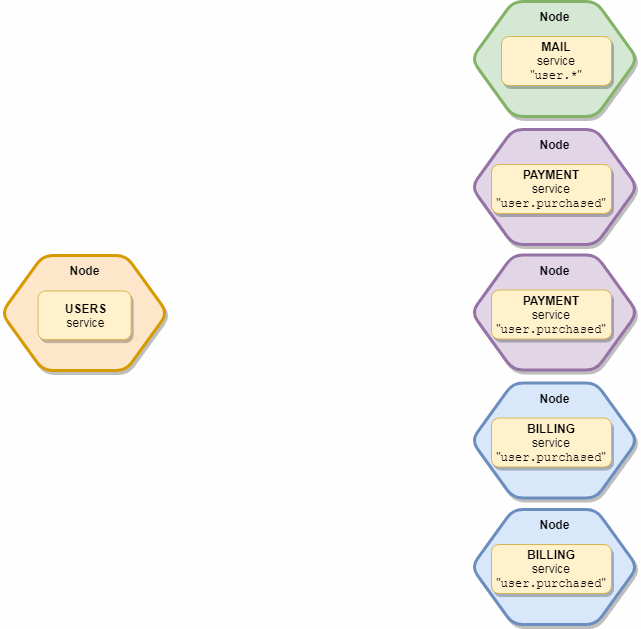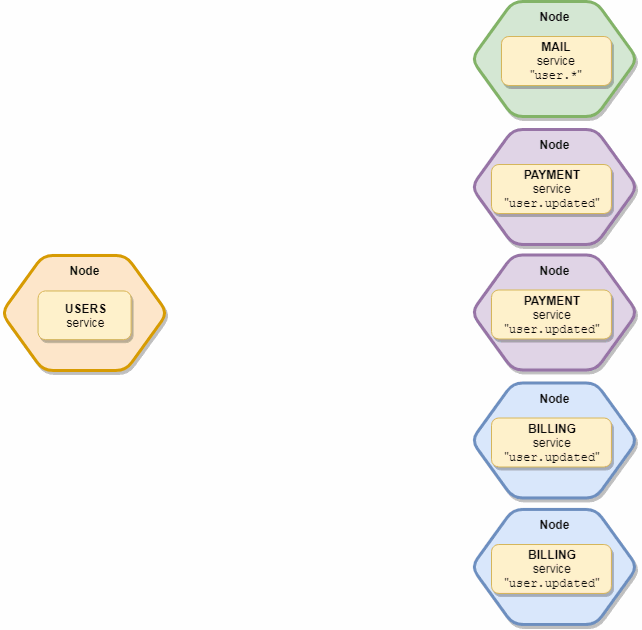Broker has a built-in event bus to support Event-driven architecture and to send events to local and remote services.
Please note that built-in events are fire-and-forget meaning that if the service is offline, the event will be lost. For persistent, durable and reliable events please check moleculer-channels.
Balanced events
The event listeners are arranged to logical groups. It means that only one listener is triggered in every group.
Example: you have 2 main services:
users&payments. Both subscribe to theuser.createdevent. You start 3 instances ofusersservice and 2 instances ofpaymentsservice. When you emit theuser.createdevent, only oneusersand onepaymentsservice instance will receive the event.

The group name comes from the service name, but it can be overwritten in event definition in services.
Example
module.exports = { |
Emit balanced events
Send balanced events with broker.emit function. The first parameter is the name of the event, the second parameter is the payload.
To send multiple values, wrap them into an Object.
// The `user` will be serialized to transportation. |
Specify which groups/services shall receive the event:
// Only the `mail` & `payments` services receives it |
Broadcast event
The broadcast event is sent to all available local & remote services. It is not balanced, all service instances will receive it.

Send broadcast events with broker.broadcast method.
broker.broadcast("config.changed", config); |
Specify which groups/services shall receive the event:
// Send to all "mail" service instances |
Local broadcast event
Send broadcast events only to all local services with broker.broadcastLocal method.
broker.broadcastLocal("config.changed", config); |
Subscribe to events
The v0.14 version supports Context-based event handlers. Event context is useful if you are using event-driven architecture and want to trace your events. If you are familiar with Action Context you will feel at home. The Event Context is very similar to Action Context, except for a few new event related properties. Check the complete list of properties
Legacy event handlersYou don’t have to rewrite all existing event handlers as Moleculer still supports legacy signature
"user.created"(payload) { ... }. It is capable to detect different signatures of event handlers:
- If it finds that the signature is
"user.created"(ctx) { ... }, it will call it with Event Context.- If not, it will call with old arguments & the 4th argument will be the Event Context, like
"user.created"(payload, sender, eventName, ctx) {...}- You can also force the usage of the new signature by setting
context: truein the event declaration
Context-based event handler & emit a nested event
module.exports = { |
Subscribe to events in ‘events’ property of services. Use of wildcards (?, *, **) is available in event names.
module.exports = { |
Event parameter validation
Similar to action parameter validation, the event parameter validation is supported.
Like in action definition, you should define params in event definition and the built-in Validator validates the parameters in events.
// mailer.service.js |
The validation errors are not sent back to the caller, they are logged or you can catch them with the new global error handler.
Internal events
The broker broadcasts some internal events. These events always starts with $ prefix.
$services.changed
The broker sends this event if the local node or a remote node loads or destroys services.
Payload
| Name | Type | Description |
|---|---|---|
localService |
Boolean |
True if a local service changed. |
$circuit-breaker.opened
The broker sends this event when the circuit breaker module change its state to open.
Payload
| Name | Type | Description |
|---|---|---|
nodeID |
String |
Node ID |
action |
String |
Action name |
failures |
Number |
Count of failures |
$circuit-breaker.half-opened
The broker sends this event when the circuit breaker module change its state to half-open.
Payload
| Name | Type | Description |
|---|---|---|
nodeID |
String |
Node ID |
action |
String |
Action name |
$circuit-breaker.closed
The broker sends this event when the circuit breaker module change its state to closed.
Payload
| Name | Type | Description |
|---|---|---|
nodeID |
String |
Node ID |
action |
String |
Action name |
$node.connected
The broker sends this event when a node connected or reconnected.
Payload
| Name | Type | Description |
|---|---|---|
node |
Node |
Node info object |
reconnected |
Boolean |
Is reconnected? |
$node.updated
The broker sends this event when it has received an INFO message from a node, (i.e. a service is loaded or destroyed).
Payload
| Name | Type | Description |
|---|---|---|
node |
Node |
Node info object |
$node.disconnected
The broker sends this event when a node disconnected (gracefully or unexpectedly).
Payload
| Name | Type | Description |
|---|---|---|
node |
Node |
Node info object |
unexpected |
Boolean |
true - Not received heartbeat, false - Received DISCONNECT message from node. |
$broker.started
The broker sends this event once broker.start() is called and all local services are started.
$broker.stopped
The broker sends this event once broker.stop() is called and all local services are stopped.
$transporter.connected
The transporter sends this event once the transporter is connected.
$transporter.disconnected
The transporter sends this event once the transporter is disconnected.
$broker.error
The broker emits this event when an error occurs in the broker.
Event payload
{ |
$transit.error
The broker emits this event when an error occurs in the transit module.
Event payload
{ |
$transporter.error
The broker emits this event when an error occurs in the transporter module.
Event payload
{ |
$cacher.error
The broker emits this event when an error occurs in the cacher module.
Event payload
{ |
$discoverer.error
The broker emits this event when an error occurs in the discoverer module.
Event payload
{ |